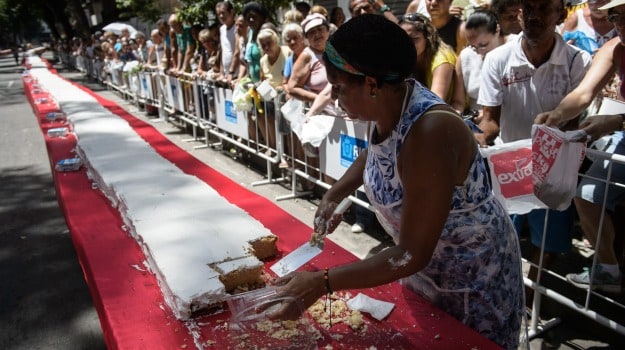Rio de Janeiro showed that partying really is a piece of cake, as residents tucked into a monster birthday confection to mark the Brazilian city's 450th anniversary.
Those adverse to carbs should look away now: the 450-meter (500-yard) cake was made with 2.5 tons of flour, 2.1 tons of sugar, 1.5 tons of margarine, 3,000 eggs, 1,000 liters (264 gallons) of milk and as much again of whipped cream.
The enormous sweet was the centerpiece of the city's birthday celebrations, and was served up on a long table reaching down Carioca Street in the heart of the city.
Thousand of people stood by, singing "Happy Birthday" before bakers and local dignitaries dished out slices to delighted locals.
Rio was founded on March 1, 1565 by Portuguese explorer and city founder Estacio de Sa. The "Cidade Maravilhosa" -- or Marvelous City -- is famed the world over for its beaches, stunning views of the Atlantic Ocean and Christ the Redeemer hilltop statue of Jesus with his arms outstretched.
"It's an enchanting, fantastic city whose beaches and natural landscapes inspire me and make me want to live life to the full," said Vilma de Lourdes, a 52-year-old cook, who was wearing a T-shirt bearing a motif of the famed statue.
This year's celebration is an extension of the just-ended Rio carnival and comprises a "cultural marathon" extending through to the Olympic Games that Rio is hosting in August 2016.
Mayor Eduardo Paes had earlier attended a mass presided over by the Cardinal Archbishop of Rio de Janeiro, Orani Tempesta, who blessed three city relics: the image of Saint Sebastian, patron saint of Rio, the remains of Estacio de Sa and the cornerstone of the church foundation.
After symbolically receiving the keys to the city from an actor dressed as Sa, Paes accompanied President Dilma Rousseff and state Governor Luiz Fernando Pezao to oversee the inauguration of a 1.4-kilometer (0.9-mile) tunnel in the port area.
The port is undergoing extensive renovations ahead of the Olympics, South America's first, which will cost some $14 billion overall.
"Rio is undergoing much transformation. We are undertaking many works which will culminate in great progress for the city -- though we know many improvements are still needed," Pezao declared.
Portuguese colonizers formally founded Rio after their predecessors first discovered the spectacular Guanabara Bay and the city's backdrop of tropical forest, home to indigenous peoples.
Rio served as Brazil's capital from 1763 to 1960, when newly built and more central Brasilia assumed the mantle.





